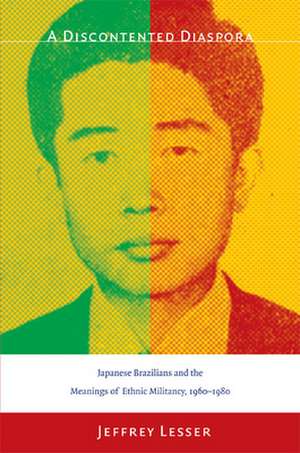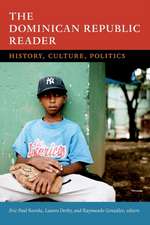A Discontented Diaspora – Japanese Brazilians and the Meanings of Ethnic Militancy, 1960–1980
Autor Jeffrey Lesseren Limba Engleză Paperback – 13 sep 2007
Preț: 260.41 lei
Nou
Puncte Express: 391
Preț estimativ în valută:
49.85€ • 54.16$ • 41.90£
49.85€ • 54.16$ • 41.90£
Carte tipărită la comandă
Livrare economică 21 aprilie-05 mai
Preluare comenzi: 021 569.72.76
Specificații
ISBN-13: 9780822340812
ISBN-10: 082234081X
Pagini: 256
Ilustrații: 29 illustrations, 8 tables, 1 map
Dimensiuni: 155 x 234 x 17 mm
Greutate: 0.36 kg
Editura: MD – Duke University Press
Locul publicării:United States
ISBN-10: 082234081X
Pagini: 256
Ilustrații: 29 illustrations, 8 tables, 1 map
Dimensiuni: 155 x 234 x 17 mm
Greutate: 0.36 kg
Editura: MD – Duke University Press
Locul publicării:United States
Recenzii
"A Discontented Diaspora is the best work that I have read on the people of Japanese descent in Latin America, bar none. Jeffrey Lessers research does no less than create a whole new vocabulary for the study of evolving Nikkei personal, artistic, and political identities. This is a book that I wish I had written.--Lane Hirabayashi, senior editor of New Worlds, New Lives: Globalization and People of Japanese Descent in the Americas and from Latin America in Japan"Two books in one: a lively and engaging examination of Brazils model minority, and a probing analysis of the ambiguities and complexities of Brazilian racial democracy. Highly recommended.--George Reid Andrews, author of Afro-Latin America, 1800-2000
"A Discontented Diaspora is the best work that I have read on the people of Japanese descent in Latin America, bar none. Jeffrey Lesser's research does no less than create a whole new vocabulary for the study of evolving Nikkei personal, artistic, and political identities. This is a book that I wish I had written."--Lane Hirabayashi, senior editor of New Worlds, New Lives: Globalization and People of Japanese Descent in the Americas and from Latin America in Japan "Two books in one: a lively and engaging examination of Brazil's 'model minority,' and a probing analysis of the ambiguities and complexities of Brazilian 'racial democracy.' Highly recommended."--George Reid Andrews, author of Afro-Latin America, 1800-2000
"A Discontented Diaspora is the best work that I have read on the people of Japanese descent in Latin America, bar none. Jeffrey Lesser's research does no less than create a whole new vocabulary for the study of evolving Nikkei personal, artistic, and political identities. This is a book that I wish I had written."--Lane Hirabayashi, senior editor of New Worlds, New Lives: Globalization and People of Japanese Descent in the Americas and from Latin America in Japan "Two books in one: a lively and engaging examination of Brazil's 'model minority,' and a probing analysis of the ambiguities and complexities of Brazilian 'racial democracy.' Highly recommended."--George Reid Andrews, author of Afro-Latin America, 1800-2000
Notă biografică
Textul de pe ultima copertă
"Two books in one: a lively and engaging examination of Brazil's 'model minority, ' and a probing analysis of the ambiguities and complexities of Brazilian 'racial democracy.' Highly recommended."--George Reid Andrews, author of "Afro-Latin America, 1800-2000"
Cuprins
Descriere
Analyzes the experiences of a generation of Japanese-Brazilians in Sao Paulo during the most authoritarian period of military rule










